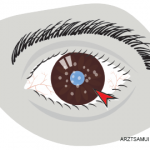Recent research shows that different inflammatory cytokines often are found in the ocular fluid of patients with uveitis, Dr. Schwartzman said. Biologic drugs may be a viable treatment option for rheumatologists whose patients have resistant eye disease. Daclizumab, infliximab, adalimumab, and etanercept have all been the focus of small clinical trials, but further and better studies are needed to measure their efficacy in these conditions, Dr. Schwartzman said. Monoclonal anti–tumor necrosis factor agents seem to provide some benefit, and infliximab is approved in Japan for Behçet’s-associated uveo-retinitis. Gevokizumab, which binds to interleukin (IL) 1β, was recently given orphan drug designation for noninfectious forms of uveitis. Newer therapies on the horizon include apremilast, tofacitinib, and anti–IL-2 and anti–IL-1 inhibitors.
“The spectrum of autoimmune, systemic diseases that affect the eye is very interesting and quite varied,” Dr. Schwartzman concluded. “Although the armamentarium of therapies available is robust and rapidly expanding, our understanding of the basic pathophysiology of this group of diseases will ultimately be necessary to prevent the unfortunate complications of inflammatory disease of the eye.”
Susan Bernstein is a writer based in Atlanta.

